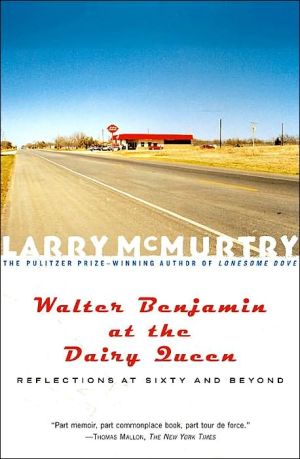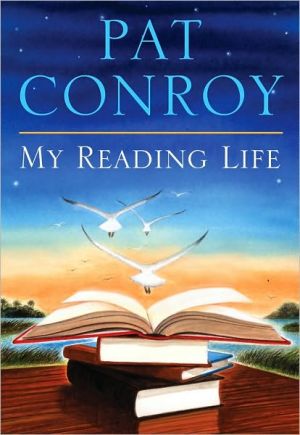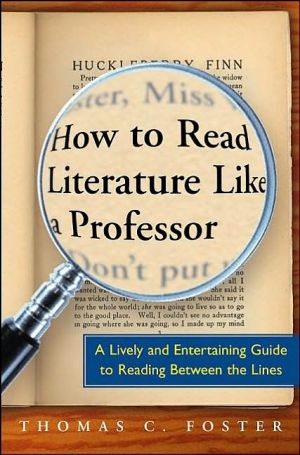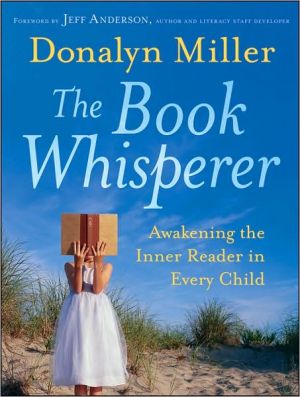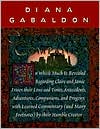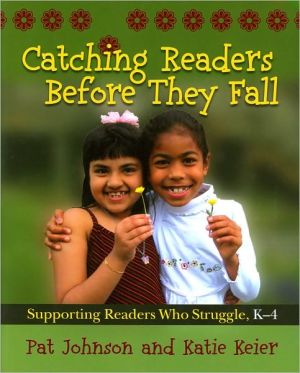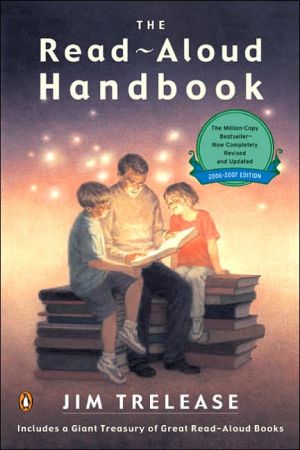Walter Benjamin at the Dairy Queen: Reflections at Sixty and Beyond
In a lucid, brilliant work of nonfiction — as close to an autobiography as his readers are likely to get — Larry McMurtry has written a family portrait that also serves as a larger portrait of Texas itself, as it was and as it has become.\ Using as a springboard an essay by the German literary critic Walter Benjamin that he first read in Archer City's Dairy Queen, McMurtry examines the small-town way of life that big oil and big ranching have nearly destroyed. He praises the virtues of...
Search in google:
McMurtry (Pulitzer prize-winning author of ) read Walter Benjamin's essay about the death of the oral tradition in a Texas Dairy Queen 20 years prior to writing this book. Benjamin's essay serves as a springboard for McMurtry's examination of the lost art of storytelling, the meaning of reading, the death of the cowboy, and the significance of Texas' vast frontier. These are recollections of a cowboy childhood and McMurtry's eventual escape from the life of men and horses and into the culture of books. Annotation c. Book News, Inc., Portland, ORSalon - Jonathan MilesLarry McMurtry has always been an elegist; nearly every one of his 23 prior books -- the bulk of them novels set amid the muted vistas and bald beige plains of McMurtry's West Texas homeland -- is suffused with a bluesy sense of waning, of loss at half-speed. In Walter Benjamin at the Dairy Queen, his first dip into the green fields of memoir, McMurtry has applied those elegiac brush strokes to the canvas of his own life. The result is a lamentation not only for himself, as he wanders into his seventh decade, but for those like him: the storytellers, the griots, the troubadours of experience. "Because of when and where I grew up, on the Great Plains just as the herding tradition was beginning to lose its vitality," McMurtry writes, "I have been interested all my life in vanishing breeds." Never has this fascination of his been so evident. Whatever subject he touches upon, even in promiscuous passing -- memory, antiquarian bookselling, his own oeuvre -- seems destined to fade gloomily away, like taillights vanishing into a blackened flat horizon. The impetus for all this melancholy, according to McMurtry, was a summer morning 19 years ago that he spent inside the Archer City, Texas, Dairy Queen reading the German essayist Walter Benjamin's "The Storyteller" -- an examination of the Russian novelist Nikolay Leskov -- in Benjamin's collection Illuminations. (Hence the insouciant title; the subtitle, "Reflections at Sixty and Beyond," pays quiet homage to Edmund Wilson's A Piece of My Mind: Reflections at Sixty.) "On that morning in 1980," McMurtry writes, "Benjamin's tremendous elegy to the storyteller as a figure of critical importance in the human community prompted me to look around the room, at that hour of the morning lightly peopled with scattered groups of coffee drinkers, to see whether I could spot a loquacious villager who -- even at that late cultural hour -- might be telling a story. And if so, was anyone really listening?" What he found was, as you might guess, on both counts no. The laments pile up: "Lore is being replaced by fact." "Then, there was no media -- now, it seems, there's no life." "The media is our memory now." "Real curiosity now gets little chance to develop -- it's smothered with information before it can draw a natural breath." There's a sour whiff of geezerdom to these appraisals, a generous dose of grandpa-grumbling. But just as ample is the supply of dead-on reckonings and critical felicities that stud the pages, which ramble breezily, like one of McMurtry's journeying characters, from thought to thought and from memory to memory. McMurtry has never been afraid in his fiction to permit a minor character to step downstage, perform a quick pirouette and then vanish. Here, meandering through his wide craggy mind, he writes no differently: Ideas come and go, like customers at the Dairy Queen. As a critic, McMurtry is far too peripatetic; his desultory analysis of Benjamin amounts to something like a raveled sweater full of aimless tangled threads. Better to view him here, I think, as a memoirist -- and more just, as well, since the majority of the book is devoted more to his history and to that of his grandparents, first-generation Texas pioneers, than to the bricks and mortar of analysis. From this angle, McMurtry's thin book glitters: His recollections of Texas ranch life -- of cowpokes puzzling over why a local farmer milked his cows before committing suicide, of his own ineptitude as a cowboy, of his childhood fears of poultry and shrubs and, most of all, of his early forays into reading -- are gorgeously drawn and rife with the sort of nimbly vigilant details that have long elevated (and occasionally salvaged) his novels. Funny -- another Western writer's memoirs, the late Louis L'Amour's Education of a Wandering Man, kept floating into my mind as I trailed McMurtry backward through his life. Like McMurtry, L'Amour was an autodidact (more so, in truth), a prodigious and vastly catholic reader and a mourner of great bookshops gone, with a keen interest in the reading habits of other writers. L'Amour's personal library boasted 10,000 books; McMurtry's has 20,000. Yet the two of them, shared surfaces notwithstanding, are in their work almost diametrically opposed. L'Amour, dismissed (more or less rightly) as a pulp writer, sought to prop up the cowpoke myths of the West. McMurtry, often dismissed as a Hollywood writer (less rightly, though the whir of an unseen film projector seems to accompany much of his later output), has throughout his long career sought to knock those myths down, to expose those ersatz illusions with a bright shine of truth -- or at least with the bland glare of the suburbs now sprawled like weeds across the West. L'Amour never needed to wax elegiac; in his mind the image of the West was fixed, like that of a dead child in its father's eye. McMurtry, however, has watched that child grow as closely as anyone has, and he isn't always pleased with the adult it's become. "I know the Earth," wrote Pablo Neruda, "and I am sad." I know the West, McMurtry seems to be saying, and I am sad. Out of that melancholy, he has fashioned a sometimes beautiful ragbag of a book: a self-portrait in which the fading of the frontier is reflected in the fading of a life; and an elegy for everything he loves, that life included.
Chapter 1\ In the summer of 1980, in the Archer City Dairy Queen, while nursing a lime Dr Pepper (a delicacy strictly local, unheard of even in the next Dairy Queen down the road — Olney's, eighteen miles south — but easily obtainable by anyone willing to buy a lime and a Dr Pepper), I opened a book called Illuminations and read Walter Benjamin's essay "The Storyteller," nominally a study of or reflection on the stories of Nikolay Leskov, but really (I came to feel, after several rereadings) an examination, and a profound one, of the growing obsolescence of what might be called practical memory and the consequent diminution of the power of oral narrative in our twentieth-century lives.\ The place where I first read the essay, Archer City's Dairy Queen, was apposite in more ways than one. Dairy Queens, simple drive-up eateries, taverns without alcohol, began to appear in the arid little towns of west Texas about the same time (the late sixties) that Walter Benjamin's work began to arrive in the English language — in the case of Illuminations, beautifully introduced by Hannah Arendt. The aridity of the small west Texas towns was not all a matter of unforgiving skies, baking heat, and rainlessness, either; the drought in those towns was social, as well as climatic. The extent to which it was moral is a question we can table for the moment. What I remember clearly is that before the Dairy Queens appeared the people of the small towns had no place to meet and talk; and so they didn't meet or talk, which meant that much local lore or incident remained private and ceased to be exchanged, debated, and stored as local lore had been during the centuries that Benjamin describes.\ The Dairy Queens, by providing a comfortable setting that made possible hundreds of small, informal local forums, revived, for a time, the potential for storytelling of the sort Walter Benjamin favored. Whether what he favored actually occurred, as opposed to remaining potential, is a question I want to consider in this essay.\ On that morning in 1980, Benjamin's tremendous elegy to the storyteller as a figure of critical importance in the human community prompted me to look around the room, at that hour of the morning lightly peopled with scattered groups of coffee drinkers, to see whether I could. spot a loquacious villager who — even at that late cultural hour — might be telling a story. And if so, was anyone really listening?\ Certainly if there were places in west Texas where stories might sometimes be told, those places would be the local Dairy Queens: clean, well-lighted places open commonly from 6 A.M. until ten at night. These Dairy Queens combined the functions of tavern, café, and general store; they were simple local roadhouses where both rambling men and stay-at-homes could meet. To them would come men of all crafts and women of all dispositions. The oilmen would be there at six in the morning; the courthouse crowd would show up about ten; cowboys would stop for lunch or a midafternoon respite; roughnecks would jump out of their trucks or pickups to snatch a cheeseburger as their schedules allowed; and the women of the villages might appear at any time, often merely to sit and mingle for a few minutes; they might smoke, sip, touch themselves up, have a cup of coffee or a glass of iced tea, sample the gossip of the moment, and leave. Regular attendance was necessary if one hoped to hear the freshest gossip, which soon went stale. Most local scandals were flogged to death within a day or two; only the steamiest goings-on could hold the community's attention for as long as a week.\ And always, there were diners who were just passing through, few of whom aspired to stay in Archer City. They stopped at the Dairy Queen as they would at a gas station, to pee and take in fuel, mindful, gloomily, that it was still a good hundred miles even to Abilene, itself no isle of grace. Few of these nomads, if they had stories to tell, bothered to tell them to the locals — and if they had wanted to tell a story or two, it is doubtful that anyone would have listened. People on their way to Abilene might as well be on their way to hell — why talk to them? Folks in Archer City knew the way to hell well enough; they need seek no guidance from traveling men.\ All day the little groups in the Dairy Queen formed and re-formed, like drifting clouds. I stayed put, imbibed a few more lime Dr Peppers, and reread "The Storyteller," concluding that Walter Benjamin was undoubtedly right. Storytellers were nearly extinct, like whooping cranes, but the D.Q. was at least the right tide pool in which to observe the few that remained.\ "The Storyteller" had been published in a journal called Orient und Okzident in the year of my birth (1936, well before electricity had arrived in the rural parts of the county where I grew up; it arrived, dramatically, when I was five, courtesy, we all felt, of FDR). It was startling to sit in that Dairy Queen, reading the words of a cosmopolitan European, a man of Berlin, Moscow, Paris, and realize that what he was describing with a clear sad eye was more or less exactly what had happened in my own small dusty county in my lifetime. I was born, in the year of the essay, into a world of rural storytellers — and what had become of them? Were any of the coffee drinkers sitting nearby doing any more than escaping the heat? Were they exchanging experiences, were they curious about life, or were they just hot?\ If the latter, they could hardly be blamed — the temperature had soared to a Sudan-like 116 that day, forcing the cancellation of the long-awaited (a century awaited), first ever Archer County marathon, a much anticipated high spot of the county's centennial celebration, itself a fortnight-long event, or congeries of events, which I had come home to watch. The celebration was certainly appropriate, but the marathon was a different matter, one in which I personally had not been able to invest much belief. Though I had long made a living by imagining unlikely lives, it was nonetheless not easy to imagine the county's dairy farmers and roughnecks and cowboys, and their wives or women, lumbering along the county's roads for anything like twenty-six miles. The marathoners, if any, would undoubtedly be imports, pros or semipros whose connection to our one-hundred-year-old county would very likely be negligible. All the same, calling off the run on a day when it was going to be 116 seemed a wise, even a compassionate policy. At 116 Fahrenheit people are likely to drop dead while doing nothing more strenuous than picking their teeth.\ Copyright © 1999 by Larry McMurtry
\ From Barnes & NobleThe Barnes & Noble Review \ Though he's perhaps best known as the author of the Pulitzer Prize-winning Lonesome Dove, Larry McMurtry has written 22 other novels, two collections of essays, and more than 30 screenplays. His latest work, Walter Benjamin at the Dairy Queen: Reflections at Sixty and Beyond, is an autobiographical rumination.\ Walter Benjamin takes its inspiration from a 1936 essay by that influential German literary critic that considers the diminishment of practical memory and the related, growing impotence of oral narrative in the 20th century.\ "What, in this age when we are so oversupplied with information, does a given human need to remember, other than, perhaps, the names of his or her spouse (if any) and children?" McMurtry asks. The media is now responsible for giving us our memories, our stories, he points out; they're no longer passed down at the dinner table. Oral stories about personal experiences don't command the attention they did in the days before television because the boredom that made people curious about those stories has been muffled by television. As well, human moral experience was rendered somewhat meaningless by World War II.\ But Walter Benjamin is much more a conversation than it is an argument, and McMurtry is not a dismal soothsayer predicting a fast-approaching cultural death. Instead, he is hopeful about the strength of narrative in modern society: Though the novel was first pronounced dead 80 years before McMurtry's birth, it is not "likely to die, not unless the middle class, which brought it into being and sustains it, dies first," he writes. Further proof, as he points out, is the relish with which young children receive stories.\ As he grew into manhood, the American frontier life that McMurtry was born into -- the son of a cattle rancher, he grew up in Archer City, Texas -- began to pass, leaving behind it the romantic legacy of the cowboy myth. McMurtry realizes he has adapted his life to that changing myth. With land diminishing and the book life calling, cattle herding would not become a life for him as it had been for his father. Rather, he chose "to herd words into novel-sized ranches" and to corral secondhand books into the huge bookstore he recently opened in Archer City. He tells us that vanishing -- or at least changing -- breeds, like the cowboy, the novel, and the secondhand bookstore, have fascinated him all his life. Some fans might be surprised and even a bit saddened to learn that the dying breed that was the primary inspiration for the Lonesome Dove tetralogy was the frontier -- the physical landscape itself -- rather than the cowboy.\ McMurtry has stated that Walter Benjamin is as close as he will ever come to writing an autobiography; as such, McMurtry aficionados will savor the book's many personal details and the insights it offers into the popular author's writing. For instance, when McMurtry was six years old, his older cousin, who was departing to serve in World War II, bequeathed 19 books to young Larry. It was then that McMurtry began to think he might become a writer. Reading quickly became "a pleasure whose stability [he] could always depend on," and literature "a vast open range, my equivalent of the cowboy's dream." Just as his parents and other frontier folk filled the empty landscape with settlements, McMurtry dedicated his life to filling empty pages and empty shelves.\ And yet the stable pleasure of reading vanished unexpectedly after he underwent quadruple-bypass surgery in 1991. Though he recovered physically from it, the operation took away McMurtry's hunger for reading -- and with that loss, a sense of identity. "The thing, more than any other, that convinced me I had in some sense died was that I [was unable to] read," he says. It would be three years before he regained his appetite for the written word, though he still feels as though his reading-recovery is not complete.\ It's not only McMurtry's loyal fans that will enjoy his reminiscent musings; anyone can learn from such a thoughtful man's experiences. Most readers will also appreciate his dark humor, demonstrated, for instance, in his observations on diet, which he believes many Americans approach as if it were a form of theology: "Fat -- or Satan -- had to be driven out.... The suggestion that fat-free food will save you from death...is everywhere present in the supermarket."\ McMurtry, who thinks "books are [still] the fuel of genius," is happy at the thought that when he passes on, he'll be leaving about a million secondhand books behind in his store. Selling books, he writes, is a modern way of passing on experience. Though essay writing isn't exactly a modern way of doing the same -- people were writing essays long before Benjamin composed the one that inspired McMurtry -- passing on experience is exactly what McMurtry has done in Walter Benjamin. Quietly and wisely, he teaches his lessons of life in a way that likely resembles the talks his cowboy ancestors had around the evening fire.\ —Maura Kelly\ Maura Kelly is a freelance writer. She lives in New York City.\ \ \ \ \ \ From the PublisherThomas Mallon The New York Times Part memoir, part commonplace book, part tour de force.\ William Murchison The Washington Times The kind of long, deep wisdom found between these covers should occasion long, deep thought, suitable for the Dairy Queen or for that matter anywhere.\ Bill Bell New York Daily News A love story about books...[Walter Benjamin at the Dairy Queen] is a sweeping, thoughtful summation, as comfortable as old boots...Richly satisfying.\ \ \ \ Jonathan MilesLarry McMurtry has always been an elegist; nearly every one of his 23 prior books -- the bulk of them novels set amid the muted vistas and bald beige plains of McMurtry's West Texas homeland -- is suffused with a bluesy sense of waning, of loss at half-speed. In Walter Benjamin at the Dairy Queen, his first dip into the green fields of memoir, McMurtry has applied those elegiac brush strokes to the canvas of his own life. The result is a lamentation not only for himself, as he wanders into his seventh decade, but for those like him: the storytellers, the griots, the troubadours of experience.\ "Because of when and where I grew up, on the Great Plains just as the herding tradition was beginning to lose its vitality," McMurtry writes, "I have been interested all my life in vanishing breeds." Never has this fascination of his been so evident. Whatever subject he touches upon, even in promiscuous passing -- memory, antiquarian bookselling, his own oeuvre -- seems destined to fade gloomily away, like taillights vanishing into a blackened flat horizon.\ The impetus for all this melancholy, according to McMurtry, was a summer morning 19 years ago that he spent inside the Archer City, Texas, Dairy Queen reading the German essayist Walter Benjamin's "The Storyteller" -- an examination of the Russian novelist Nikolay Leskov -- in Benjamin's collection Illuminations. Hence the insouciant title; the subtitle, "Reflections at Sixty and Beyond," pays quiet homage to Edmund Wilson's A Piece of My Mind: Reflections at Sixty. "On that morning in 1980," McMurtry writes, "Benjamin's tremendous elegy to the storyteller as a figure of critical importance in the human community prompted me to look around the room, at that hour of the morning lightly peopled with scattered groups of coffee drinkers, to see whether I could spot a loquacious villager who -- even at that late cultural hour -- might be telling a story. And if so, was anyone really listening?" What he found was, as you might guess, on both counts no.\ The laments pile up: "Lore is being replaced by fact." "Then, there was no media -- now, it seems, there's no life." "The media is our memory now." "Real curiosity now gets little chance to develop -- it's smothered with information before it can draw a natural breath." There's a sour whiff of geezerdom to these appraisals, a generous dose of grandpa-grumbling. But just as ample is the supply of dead-on reckonings and critical felicities that stud the pages, which ramble breezily, like one of McMurtry's journeying characters, from thought to thought and from memory to memory. McMurtry has never been afraid in his fiction to permit a minor character to step downstage, perform a quick pirouette and then vanish. Here, meandering through his wide craggy mind, he writes no differently: Ideas come and go, like customers at the Dairy Queen.\ As a critic, McMurtry is far too peripatetic; his desultory analysis of Benjamin amounts to something like a raveled sweater full of aimless tangled threads. Better to view him here, I think, as a memoirist -- and more just, as well, since the majority of the book is devoted more to his history and to that of his grandparents, first-generation Texas pioneers, than to the bricks and mortar of analysis. From this angle, McMurtry's thin book glitters: His recollections of Texas ranch life -- of cowpokes puzzling over why a local farmer milked his cows before committing suicide, of his own ineptitude as a cowboy, of his childhood fears of poultry and shrubs and, most of all, of his early forays into reading -- are gorgeously drawn and rife with the sort of nimbly vigilant details that have long elevated and occasionally salvaged his novels.\ Funny -- another Western writer's memoirs, the late Louis L'Amour's Education of a Wandering Man, kept floating into my mind as I trailed McMurtry backward through his life. Like McMurtry, L'Amour was an autodidact more so, in truth, a prodigious and vastly catholic reader and a mourner of great bookshops gone, with a keen interest in the reading habits of other writers. L'Amour's personal library boasted 10,000 books; McMurtry's has 20,000.\ Yet the two of them, shared surfaces notwithstanding, are in their work almost diametrically opposed. L'Amour, dismissed more or less rightly as a pulp writer, sought to prop up the cowpoke myths of the West. McMurtry, often dismissed as a Hollywood writer less rightly, though the whir of an unseen film projector seems to accompany much of his later output, has throughout his long career sought to knock those myths down, to expose those ersatz illusions with a bright shine of truth -- or at least with the bland glare of the suburbs now sprawled like weeds across the West. L'Amour never needed to wax elegiac; in his mind the image of the West was fixed, like that of a dead child in its father's eye. McMurtry, however, has watched that child grow as closely as anyone has, and he isn't always pleased with the adult it's become.\ "I know the Earth," wrote Pablo Neruda, "and I am sad." I know the West, McMurtry seems to be saying, and I am sad. Out of that melancholy, he has fashioned a sometimes beautiful ragbag of a book: a self-portrait in which the fading of the frontier is reflected in the fading of a life; and an elegy for everything he loves, that life included.\ — Salon\ \ \ \ \ \ Publishers WeeklyAfter reading an essay by Walter Benjamin in a Dairy Queen during his hometown's centennial celebration, McMurtry set out to ponder how Benjamin's conclusions about the death of the oral tradition apply to his own desolate patch of Texas cattle country. That essay, "The Storyteller," is the touchstone McMurtry returns to throughout this digressive, erudite and frequently glum assessment of his career and the importance of storytelling. "Real curiosity," he writes, "now gets little chance to develop--it's smothered with information before it can draw a natural breath." Taking a break from writing fiction to think "about place, about my life, about literature and my relation to it," the bestselling author (Comanche Moon, etc.) and purveyor of antiquarian books offers prickly appraisals of great writers. A devotee of European literature, McMurtry considers Virginia Woolf's diaries and Proust's 12-volume opus the White Nile and Blue Nile of language. As for critics, he spurns theorists for those he considers great readers (Susan Sontag, Edmund Wilson and V.S. Pritchett, among others). Surveying his own two dozen books, he feels much like his cattle ranching father at the end of his life, contemplating his "too meager acres" and concluding he could have done more. At the same time, McMurtry claims he has exhausted the themes that interest him and hints that he may be done with fiction for good. The most infectious element in this book-length essay is McMurtry's passion for reading, which was rooted in boyhood and blossomed into a lifelong quest to understand the European culture that spawned his own pioneer family--a quest that brings him full circle back to Benjamin. It all adds up to a thoughtful, elegant retrospective on Texas, his work and the meaning of reading by an author who has the range to write with intelligence about both Proust and the bathos of a Holiday Inn marquee. (Nov.) Copyright 1999 Cahners Business Information.\ \ \ \ \ Library JournalWhen McMurtry (of Lonesome Dove fame) was coming up in Archer County, TX, books other than the Bible were as scarce as company. In this roundabout and finely written memoir, McMurtry approaches the topic of storytelling (using German literary critic Benjamin as a springboard) by telling his own. (LJ 10/1/99) Copyright 2000 Cahners Business Information.\ \ \ \ \ Kirkus ReviewsAn elegiac essay on memory and the power of storytelling by a master of the art. Well-known as a Pulitzer-winning novelist (Duane's Depressed, 1998, etc.), McMurtry turns less often to nonfiction. It's usually a delight when he does. In this book-length meditation on the past—his own, that of his ancestors, and that of the corner of west Texas whence they hail—McMurtry works from an unlikely conceit: rereading the work of the German-Jewish literary journalist Walter Benjamin over a lime Dr. Pepper (for which he gives the recipe) at a drive-through diner out on the dry plains of Archer City, the town McMurtry made famous in The Last Picture Show and other novels. Benjamin never saw a prickly pear in his life, but he had much to say about personal history and storytelling in an age that isn't much interested in either. So, too, does McMurtry, who touches on issues of his craft (he writes that one of his purposes as a novelist has been to people the empty frontier in which he grew up), the pleasures of reading and collecting books, the lost art of conversation over supper, the aftereffects of heart attacks and urban renewal, and the tricky business of memory. (In west Texas, he observes, "Sudden death, particularly death on the highway—as much a part of that culture as football—lodged in people's memories, whereas about almost everything else they were vague"). It's philosophy, literary criticism, and memoir all rolled up into one neat package, and McMurtry's constant readers will find much pleasure in these pages.\ \
